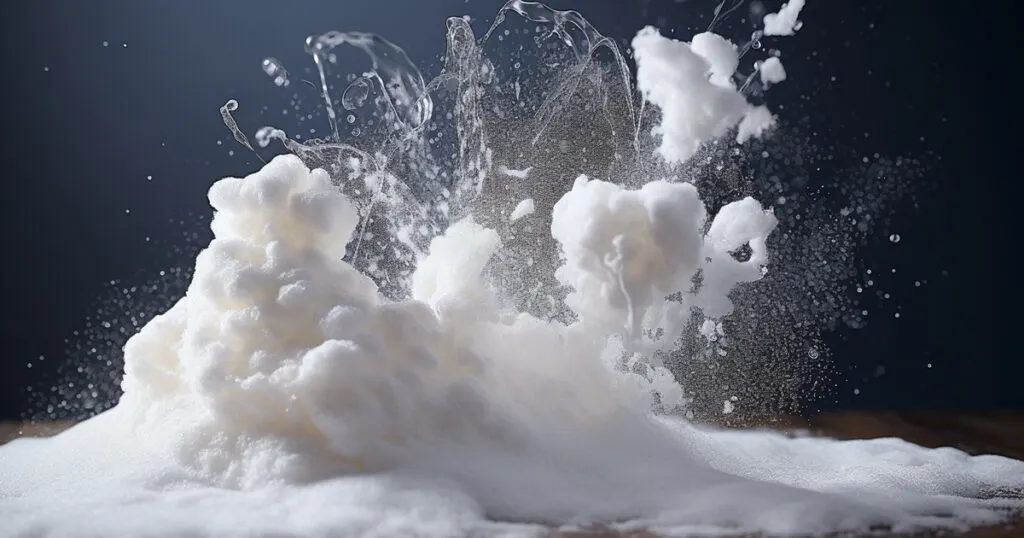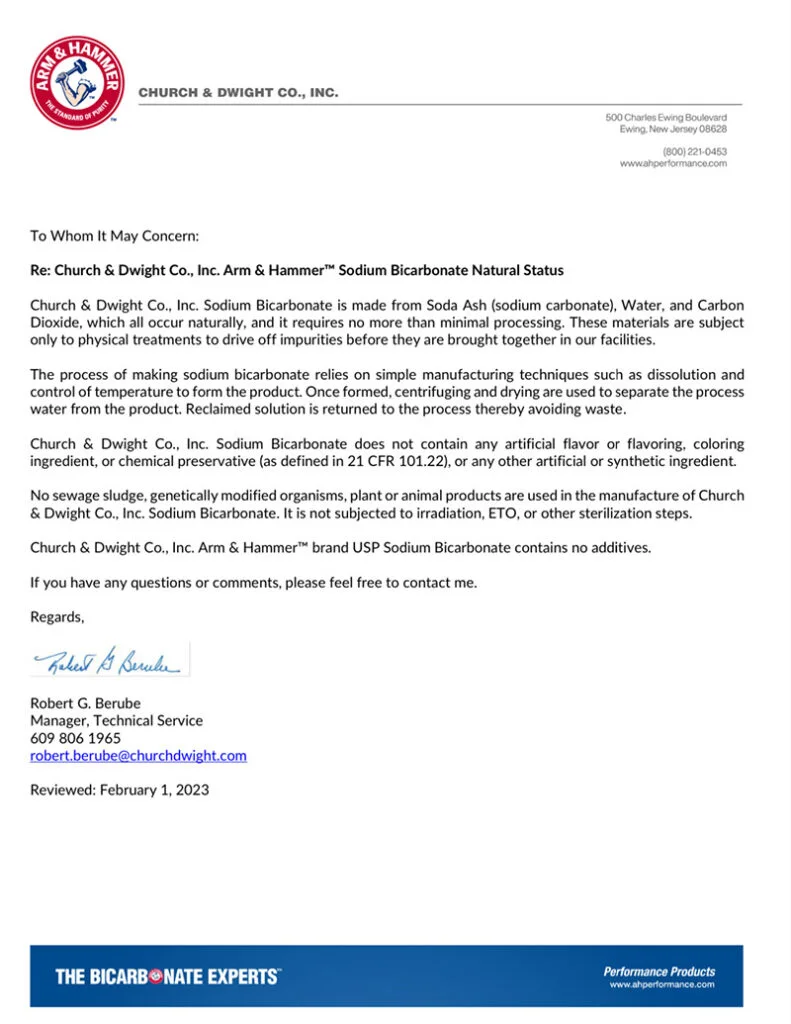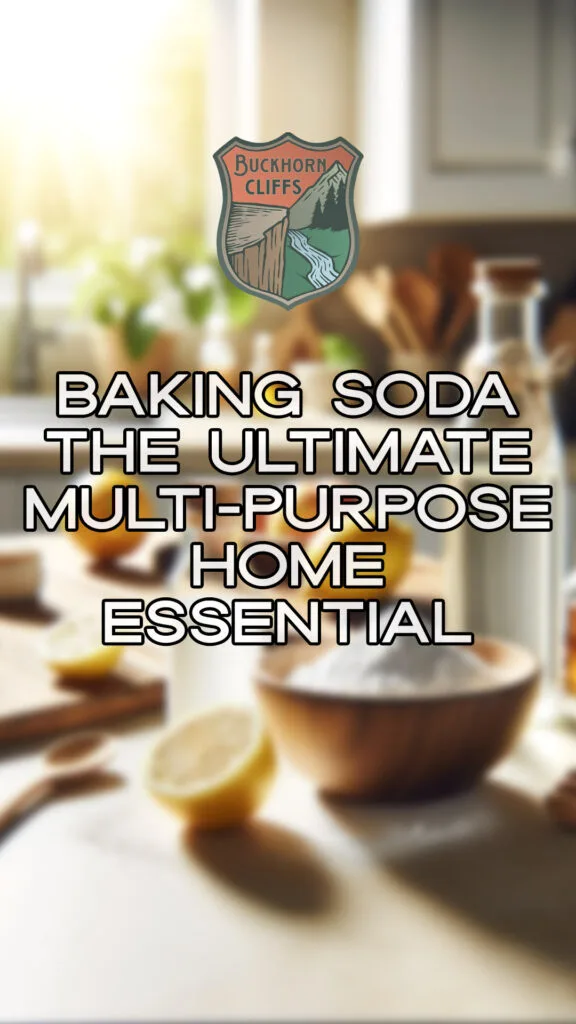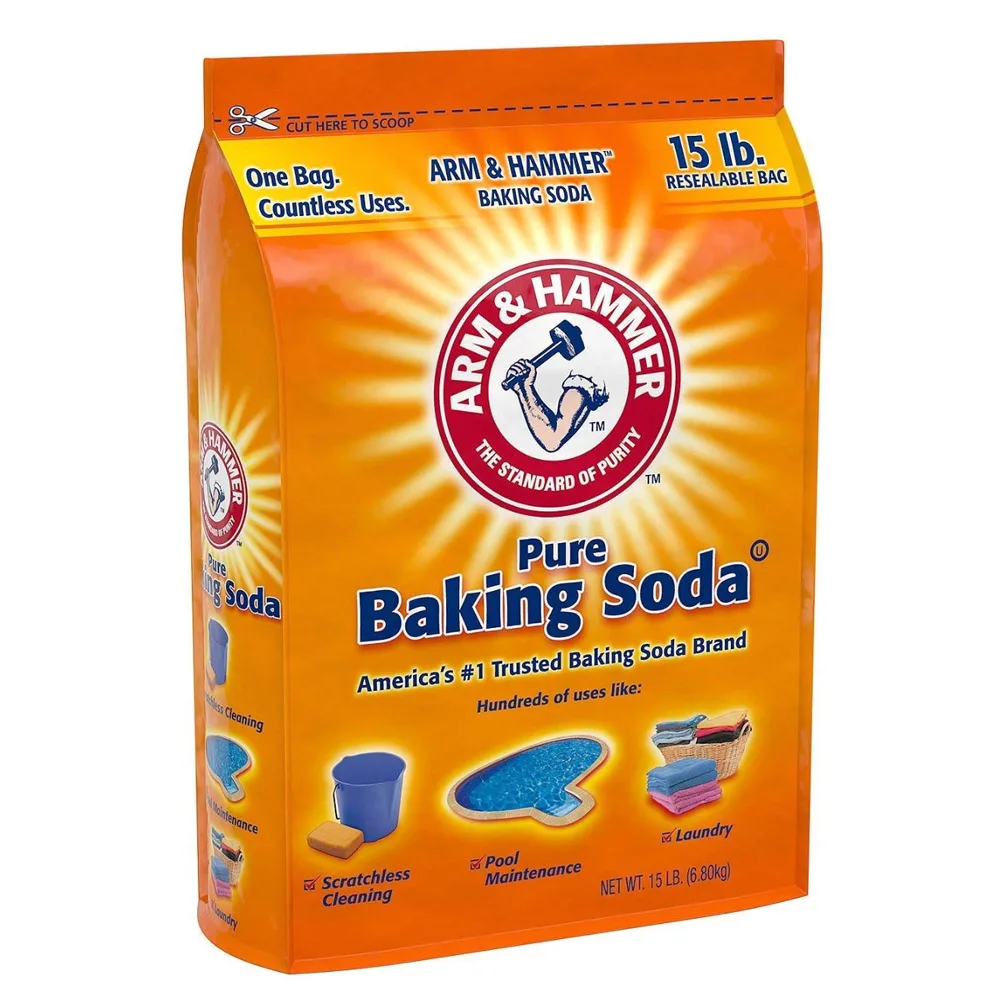Baking soda, or sodium bicarbonate, is one of the most versatile household items. Many of us only use it as a leavening agent for baking, but it has so many more uses. From cleaning to personal care, to gardening and home maintenance, this simple white powder is a must-have for emergency storage and everyday use.

Cooking
Most people know baking soda as a leavening agent used in baking. It reacts with an acid (like vinegar or lemon juice) to create carbon dioxide gas, which helps dough rise. But did you know it can also be used to tenderize meat? Just rub the baking soda onto the meat and let it sit in the refrigerator for several hours. Then rinse it off thoroughly before cooking. Also, if you find yourself out of self-rising flour, you can make your own by adding 1.5 teaspoons of baking soda and a half teaspoon of salt to one cup of all-purpose flour.
Cleaning
The mild abrasive quality of baking soda makes it an excellent cleaner for surfaces without scratching them. It effectively breaks down grease and can be used to clean ovens, countertops, and sinks. Make a paste with water and scrub away the grime. For tougher stains, let the paste sit for a few minutes before scrubbing. Additionally, it can be used to unclog drains. Pour a cup of baking soda down the drain, followed by a cup of hot vinegar. Wait 15 minutes and then rinse with hot water.
Odor Neutralization
Baking soda is a natural deodorizer. It neutralizes odors rather than just masking them. Sprinkle it on carpets, in fridges, in stinky shoes, and so much more. Leave it for a few hours or overnight and then vacuum or wipe away. Also, a small open box of baking soda in the fridge or freezer can help to keep odors at bay.
Personal Care
Baking soda can also be used in personal care. It can be used as a toothpaste, by making a paste with water. It is a mild abrasive and can help to remove surface stains on the teeth. Additionally, it can be used as a deodorant. Just pat some baking soda under your arms. It neutralizes the body odor by balancing the pH levels. It can also be used to relieve insect bites and itchy skin. Make a paste with water and apply to the affected area.
Sunburn Relief
Cool Compress: Dissolve 2-3 tablespoons of baking soda in cool water. Soak a cloth in the solution and apply to the sunburn for 10-15 minutes. Repeat as needed.
Bath Soak: Add 1/2 cup of baking soda to a lukewarm bath. Soak for 15-20 minutes, then pat the skin dry gently.
Paste Application: Mix baking soda with water to form a paste. Apply to the sunburn, leave for 10-15 minutes, then rinse with cool water.
Spray Solution: Mix 1 tablespoon of baking soda with 1 cup of water in a spray bottle. Shake and spray on the sunburn. Allow it to air dry.How Vinegar Relieves Sunburn
How Vinegar Relieves Sunburn
Cooling Sensation: Vinegar, especially apple cider vinegar, provides a soothing, cooling effect to sunburned skin.
Antiseptic Benefits: The acetic acid in vinegar acts as an antiseptic, helping prevent infections in sunburned areas.
pH Balance: Vinegar helps balance the skin’s pH, reducing stinging and burning sensations.
Moisture Retention: Vinegar aids in retaining skin moisture, preventing dryness and promoting faster healing.
Reduces Inflammation: Its anti-inflammatory properties help reduce swelling and redness.
Fire Extinguisher
In an emergency, baking soda can help extinguish small grease and electrical fires. It works by releasing carbon dioxide, which smothers the fire. However, it is important to remember that this should only be used for small fires. For larger fires, it is always safer to use a fire extinguisher or call for help.
Laundry
Baking soda is a natural detergent booster. Add a half cup of baking soda to your laundry to boost your detergent’s cleaning power. It also helps to soften water, which means you can use less detergent. Moreover, it neutralizes odors in your clothes, leaving them smelling fresh.
Gardening
Baking soda can be used as a natural pesticide. It works against fungal diseases in plants. Mix one tablespoon of baking soda with 2.5 liters of water and spray on the affected plants. Also, it can be used as a soil neutralizer. Sprinkle baking soda on the soil surface to lower its acidity.
Health
Baking soda can relieve heartburn, indigestion, and ulcer pain. Mix a half teaspoon of baking soda with half a cup of water and drink it. However, it is important to note that this should not be used as a regular treatment for chronic conditions. Always consult a healthcare professional for serious health issues.
Storage
Best of all, baking soda has an indefinite shelf life if stored correctly. Keep it in a cool, dry place, and it will stay good for years. This makes it an ideal item for emergency storage.
Common Questions about Baking Soda
What is sodium bicarbonate?
Sodium bicarbonate, commonly known as baking soda, is a white crystalline powder that is naturally alkaline, or basic. The chemical formula for sodium bicarbonate is NaHCO3. It is a salt composed of a sodium cation (Na+) and a bicarbonate anion (HCO3-).
Can baking soda be used as a substitute for baking powder?
Baking soda can be used as a substitute for baking powder, but you need to add an acid to activate it. Baking soda is pure sodium bicarbonate, while baking powder contains sodium bicarbonate and an acidifying agent (cream of tartar) plus a drying agent (usually starch).
To substitute baking powder with baking soda and an acid, you can use this general rule: for every teaspoon of baking powder, use 1/4 teaspoon of baking soda and 1/2 teaspoon of an acid (like cream of tartar or lemon juice).
However, this substitute may not work perfectly in all recipes, as it can affect the taste and texture of the final product. It’s always best to use the ingredient that the recipe calls for if possible.
What brand do you recommend?
Arm & Hammer might be the most widely available and is what I purchase.
Does Arm & Hammer contain aluminum or other harmful ingredients?
No, it’s made from soda ash, water, and carbon dioxide (all natural). I reached out to Arm and Hammer and this is their full statement:

What’s the best way to store baking soda?
Baking soda should be stored in a cool, dry place, away from any moisture or humidity. Here are some storage tips:
- Original Packaging: If unopened, you can store it in its original packaging.
- Airtight Container: Once opened, transfer the baking soda to an airtight container to prevent it from absorbing odors or moisture from the air.
- Cool, Dry Place: Store the container in a cool, dry place like a pantry or cupboard, away from the stove or any heat source.
- Avoid Contamination: Use a clean, dry spoon or utensil every time you take baking soda out of the container to avoid contamination.
Is it safe to ingest baking soda?
Yes, baking soda (sodium bicarbonate) is safe to ingest in moderate amounts. It is commonly used in baking as a leavening agent and can also be dissolved in water and ingested to help relieve heartburn or indigestion. However, it’s important to use it sparingly and not exceed recommended doses.
Too much baking soda can lead to alkalosis, a condition caused by the body’s pH becoming too alkaline. This can cause nausea, vomiting, muscle spasms, and other symptoms. In severe cases, it can be life-threatening.
What are the potential dangers of using baking soda?
Baking soda, or sodium bicarbonate, is generally safe for most people when used in moderation. However, there are potential dangers associated with its use:
- Alkalosis: Consuming too much baking soda can lead to alkalosis, a condition characterized by the body’s pH becoming too alkaline. This can cause symptoms such as nausea, vomiting, muscle spasms, and in severe cases, can be life-threatening.
- Drug Interactions: Baking soda can interact with certain medications, affecting their absorption or efficacy. For example, it can decrease the effectiveness of some drugs, while it can increase the side effects of others. Always consult a healthcare professional before combining baking soda with any medications.
- Stomach Rupture: Consuming baking soda and an acid (e.g., vinegar) in large amounts can cause a chemical reaction that produces gas rapidly, which can lead to a stomach or esophagus rupture, although this is extremely rare.
- Impaired Nutrient Absorption: Excessive consumption of baking soda can lead to impaired nutrient absorption, particularly of folate and vitamin B12.
Is it safe to use baking soda on the skin?
Baking soda is sometimes used as a natural remedy for skin issues. Here are a few things to consider:
- pH Balance: The skin has a natural pH of about 4.7 to 5.75, which is slightly acidic. Baking soda, on the other hand, has a pH of about 9, which is alkaline. Using baking soda on the skin can disrupt its pH balance, which can lead to dryness, irritation, and other skin problems.
- Sensitivity: Some people have more sensitive skin than others. If your skin is sensitive, baking soda may cause irritation, redness, or a rash.
- Abrasive: Baking soda has a slightly abrasive texture, which can help exfoliate dead skin cells. However, it can be too abrasive for some people, leading to skin irritation.
What is the reaction between baking soda and vinegar?
The reaction between baking soda (sodium bicarbonate) and vinegar (acetic acid) is a classic example of an acid-base reaction. This reaction results in the formation of carbon dioxide gas, water, and sodium acetate. Here is the chemical equation for the reaction:
NaHCO3+CH3COOH→CO2+H2O+CH3COONaNaHCO3+CH3COOH→CO2+H2O+CH3COONa
- Sodium bicarbonate (NaHCO3) reacts with acetic acid (CH3COOH) to form carbon dioxide (CO2) gas, which creates fizzy bubbles.
- The reaction also produces water (H2O) and sodium acetate (CH3COONa), which is a salt.
What are some unusual or less known uses for baking soda?
- Fire Extinguisher: Baking soda can help in extinguishing small grease and electrical fires. When heated, it releases carbon dioxide, which helps to suffocate the flames.
- Insect Bites and Itchy Skin: Make a paste with water and apply to insect bites or itchy skin to relieve discomfort.
- Natural Deodorant: Baking soda can be used as a natural deodorant. Just pat some baking soda onto your underarms.
- Car Battery Cleaner: Baking soda can be used to clean corrosion from car batteries. Make a paste with water and apply with a brush.
- Weed Killer: Sprinkle baking soda in the cracks of your driveway or sidewalks to kill small weeds.
- Flower Freshener: Adding a teaspoon of baking soda to a vase of cut flowers will keep them fresh longer.
- Jewelry Cleaner: Make a paste with water and rub gently onto silver jewelry, then rinse off and polish dry.
- Foot Soak: Add a tablespoon of baking soda to warm water and soak feet to help with odor and to soften the skin.
- Splinter Removal: Soaking the affected area in a baking soda and water solution can help to raise the splinter to the surface of the skin, making it easier to remove.
- Sunburn Relief: Adding baking soda to a lukewarm bath can help soothe sunburned skin.
Does baking soda have an expiration date or does it lose potency over time?
Baking soda does not have a specific expiration date and does not spoil or become harmful over time. However, over time, baking soda can lose its potency and effectiveness as a leavening agent. This typically happens if the baking soda is exposed to moisture or other contaminants. For best results, it is recommended to replace your baking soda every 6 months to a year if you are using it for baking. For other uses, such as cleaning, the potency is less critical.
To check if baking soda is still good for baking, you can do a quick test by adding a spoonful of baking soda to a small amount of vinegar or lemon juice. If it bubbles vigorously, it is still potent.
Is it safe to mix baking soda with other household products?
It is generally safe to mix baking soda with other household products, but there are a few exceptions and precautions to be aware of:
- Baking Soda and Vinegar: This is a commonly used combination for cleaning purposes. When mixed, they create a reaction that produces carbon dioxide gas, which can help in cleaning clogs, for example. However, this reaction essentially neutralizes both the vinegar and the baking soda, so it’s debatable how effective this mix is for cleaning.
- Baking Soda and Bleach: It is not advisable to mix baking soda with bleach or any product containing bleach. Mixing bleach with an acid (vinegar, lemon juice, etc.) can release toxic chlorine gas, and mixing bleach with an alkali (like baking soda) could also potentially release toxic gas (chloramine gas).
- Baking Soda and Lemon Juice: This mix is usually safe and can be used for cleaning and deodorizing.
What’s the difference between baking soda and baking powder?
In the realm of baking and cooking, understanding the distinction between baking soda and baking powder is akin to wielding a magic wand in your kitchen. These two pantry staples, often mistaken for one another due to their similar names, serve different roles and possess distinct properties that can make or break your culinary creations.
Baking Soda: The Mighty Leavening Agent
Baking soda, scientifically known as sodium bicarbonate, is a pure and straightforward leavening agent. It’s a solo act, requiring an acidic ingredient (like buttermilk, yogurt, or vinegar) and moisture to activate its leavening powers. When these conditions are met, baking soda undergoes a chemical reaction, releasing carbon dioxide gas. This gas gets trapped within your dough or batter, causing it to rise and become delightfully fluffy.
Besides its leavening prowess, baking soda is renowned for its versatility. Its ability to neutralize acids and bases makes it an effective ingredient in many household remedies and cleaning solutions. So, whether you’re whipping up pancakes or extinguishing a grease fire, baking soda is a trusty sidekick.
Baking Powder: The Harmonious Blend
In contrast, baking powder is a harmonious blend of baking soda, a weak acid (usually cream of tartar), and a starch to prevent premature activation. This premixed concoction makes life in the kitchen more convenient. When liquid is added to your recipe, baking powder releases carbon dioxide gas in two stages: first when mixed with wet ingredients and again when exposed to heat in the oven. This dual-action leavening is why baking powder is often labeled as “double-acting.”
The inclusion of an acid within baking powder means it can work its magic without the need for an additional acidic component in your recipe. This versatility makes it an excellent choice for recipes where you don’t want to rely on naturally acidic ingredients.
Why Bulk Baking Soda Is a Must-Have
Why should you have bulk baking soda on hand? The answer is simple: versatility and shelf life. While baking soda loses its leavening power over time, its role in cleaning, deodorizing, and even providing first aid remains unchanged. Its shelf life is essentially indefinite, ensuring you’re well-prepared for both culinary adventures and household emergencies.
So, the next time you’re in the baking aisle, remember that baking soda and baking powder are not interchangeable. Each has its own unique purpose, and having a reliable supply of both can transform you into a kitchen magician capable of creating culinary wonders and tackling everyday challenges.
Conclusion
Baking soda is a magic ingredient that everyone should have on hand. Not only is it useful for everyday tasks, but it is also essential for emergency situations. From cooking to cleaning, personal care, and home maintenance, its versatility makes it a valuable addition to any home. So, stock up on baking soda and make the most of its many benefits!
Pin it


